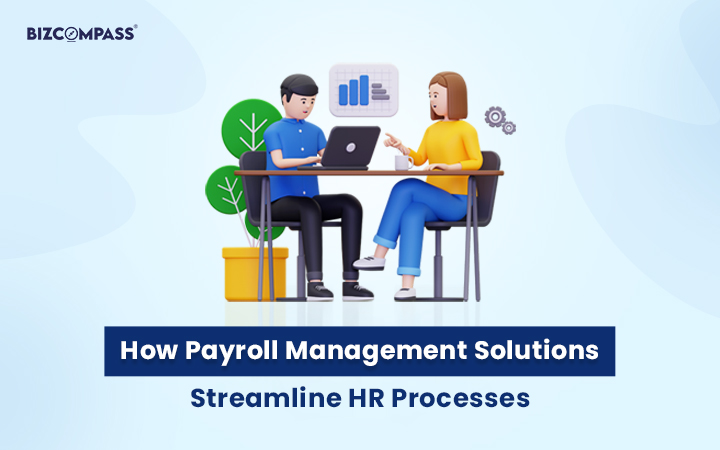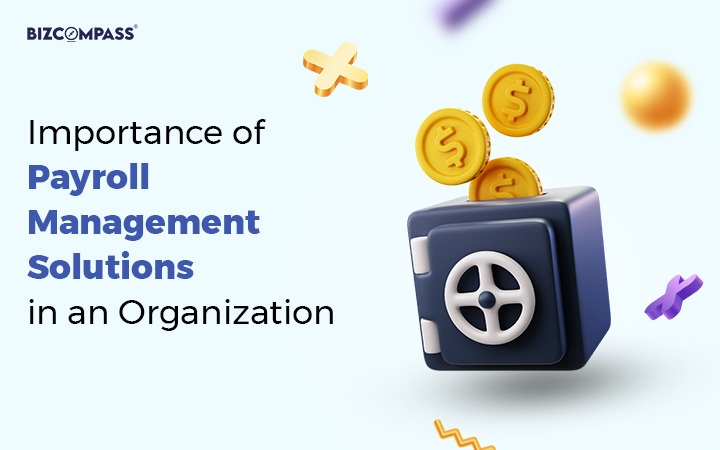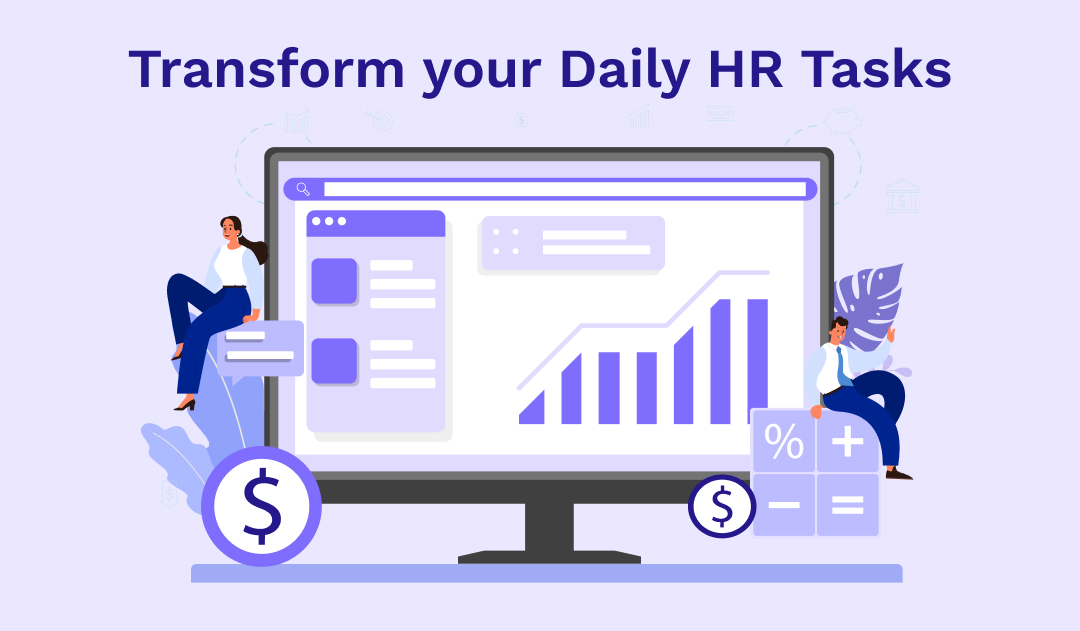Introduction
Payroll management solutions refer to the systems, software, and processes utilized by organizations to effectively manage and administer employee compensation, including wages, salaries, bonuses, deductions, and taxes. These solutions encompass a range of activities, such as calculating payments, maintaining accurate records, processing payroll taxes, and ensuring compliance with legal regulations and company policies. Â
Payroll management solutions may be implemented through in-house software, outsourced services, or cloud-based platforms tailored to the specific needs and size of the organization. Â
Streamlining HR processes, including payroll management, is crucial for organizations to operate efficiently and effectively. By automating and optimizing payroll procedures, businesses can reduce the likelihood of errors, ensure timely and accurate employee payments, and enhance overall compliance with regulatory requirements. Â
Additionally, streamlined HR processes free up valuable time and resources for HR personnel to focus on strategic initiatives such as talent management, employee development, and organizational growth. Moreover, efficient payroll management contributes to employee satisfaction and morale by providing transparent and reliable compensation practices. Â
The importance of streamlining HR processes, including payroll management, cannot be overstated, as it enhances operational efficiency and supports organizational success and employee engagement.Â
The Evolution of Payroll Management Solutions
Traditionally, payroll management involved manual processes that were labor-intensive and prone to errors. Organizations relied on paper-based systems to calculate employee wages, deductions, and taxes. These methods often involved time-consuming tasks such as manually entering data, computing payments, and preparing physical checks for distribution. Â
Additionally, compliance with tax laws and regulations required meticulous record-keeping and often necessitated the involvement of specialized personnel or third-party services. Â
The advent of automated payroll systems revolutionized payroll management by introducing efficiency, accuracy, and cost-effectiveness. Â
Automated payroll software enabled organizations to streamline payroll processes by automating calculations, tax deductions, and payment distribution. Â
These systems are integrated with timekeeping and attendance tracking solutions, allowing for seamless data transfer and accurate recording of employee hours worked. Â
Automated payroll systems also provided features such as direct deposit, electronic pay stubs, and automated tax filing, reducing administrative burdens and enhancing employee satisfaction. Â Â
In recent years, cloud-based payroll management solutions have emerged as the latest evolution in payroll technology. Cloud-based platforms offer increased accessibility, scalability, and flexibility compared to traditional on-premises systems. Â
These solutions leverage cloud computing technology to provide real-time access to payroll data from anywhere with an internet connection, enabling remote work and mobile access for employees and administrators alike. Â
Moreover, cloud-based payroll systems offer seamless integration with other HR and accounting software, facilitating data sharing and process automation across various functions. Â
Cloud-based payroll solutions offer enhanced security measures to protect sensitive payroll data, including encryption, multi-factor authentication, and regular data backups. Â
Furthermore, cloud-based platforms typically operate on a subscription-based pricing model, eliminating the need for costly upfront investments in hardware and software licenses. Â
The evolution of payroll management solutions from traditional methods to automated systems and, ultimately, to cloud-based platforms has significantly improved efficiency, accuracy, and accessibility in managing payroll processes for organizations of all sizes.Â
Key Features of Payroll Management Solutions That Help HR
Payroll management solutions offer a range of key features and benefits, including automation of payroll calculations, integration with HRIS and other systems, compliance management, time and attendance tracking, and employee self-service portals. Â
These features collectively improve efficiency, accuracy, compliance, and employee satisfaction in managing organizational payroll processes.Â
01 Automation of Payroll CalculationsÂ
One of the primary features of payroll management solutions is the automation of payroll calculations. These systems streamline the process of computing employee wages, deductions, taxes, and other relevant payroll components. Automation reduces manual errors, ensures accuracy, and saves time for HR personnel, allowing them to focus on more strategic tasks.Â
02 Integration with HRIS And Other SystemsÂ
Payroll management solutions often integrate seamlessly with Human Resources Information Systems (HRIS) and other related systems, such as time and attendance tracking software. Â
This integration enables efficient data sharing and synchronization between payroll, HR, and other organizational systems, ensuring consistency and accuracy in payroll processing.Â
03 Compliance ManagementÂ
Compliance management is a critical feature of payroll management solutions. These systems are designed to stay up to date with relevant labor laws, tax regulations, and statutory requirements, ensuring that payroll processes remain compliant with legal and regulatory standards. Automated compliance management helps organizations avoid penalties, fines, and legal liabilities associated with payroll-related non-compliance.Â
04 Time and Attendance TrackingÂ
Many payroll management solutions offer integrated time and attendance tracking features. These functionalities allow organizations to accurately track employee work hours, breaks, and absences, facilitating precise payroll calculations based on actual hours worked. Â
Time and attendance tracking enables organizations to identify trends, monitor productivity, and enforce attendance policies effectively.Â
05 Employee Self-Service PortalsÂ
Employee self-service portals are another valuable feature of modern payroll management solutions. These portals empower employees to access their payroll-related information, including pay stubs, tax forms, and benefit details, without involving HR personnel. Â Â
Self-service portals enhance employee satisfaction, engagement, and autonomy while reducing administrative workload for HR departments.Â
06 Cost-Effectiveness and Time SavingsÂ
Payroll management solutions significantly reduce manual work and human errors associated with manual payroll processing. Automation streamlines tasks such as data entry, calculation, and tax compliance, minimizing the risk of inaccuracies and costly mistakes. Â
By automating payroll processes, organizations can lower administrative costs associated with manual payroll management. Reduced manual intervention leads to fewer hours spent on payroll-related tasks, resulting in cost savings in personnel hours and resources. Â
With payroll management solutions handling repetitive and time-consuming tasks, organizations can allocate resources more efficiently to other critical areas of operations, such as strategic planning, talent management, and employee development. Â
By freeing HR personnel from manual payroll processing, organizations can reallocate their human resources to more strategic tasks contributing to organizational growth and success. Â Â
This shift enables HR professionals to focus on recruitment, training, and employee engagement initiatives, adding value to the organization beyond administrative functions.Â
Brief On How HR Procedures Are Simplified by Payroll Solutions
Payroll management solutions play a crucial role in streamlining HR processes by automating and optimizing various tasks related to employee compensation, tax compliance, and administrative workflows. Payroll management solutions automate the payroll process, from calculating employee wages and deductions to initiating direct deposits. Â
Automation reduces manual errors, saves time, and ensures accuracy in payroll calculations, thereby streamlining the payroll process and minimizing the need for manual intervention. Many payroll management solutions integrate seamlessly with time and attendance tracking systems. Â
This integration automatically captures employee work hours, breaks, and overtime, which are then used for accurate payroll calculations. Â
By eliminating the need for manual data entry and reconciliation between payroll and timekeeping systems, integration streamlines the payroll process and reduces the risk of errors. Â
They incorporate features to ensure compliance with tax regulations, labor laws, and other statutory requirements. These solutions automatically update tax tables, calculate payroll taxes, and generate tax forms following legal standards. Â
By staying up to date with regulatory changes and automating compliance-related tasks, payroll management solutions streamline HR processes and mitigate the risk of non-compliance. Â
The systems offer self-service portals where employees can access their payroll information, such as pay stubs, tax forms, and benefit details. Â
By providing employees with direct access to their payroll data, self-service portals reduce the administrative burden on HR personnel who would otherwise have to fulfill employee requests for information. This empowers employees to manage payroll-related inquiries, streamlining HR processes and improving employee satisfaction. They often include reporting and analytics capabilities that provide insights into payroll-related data. Â
HR departments can generate customizable reports on payroll expenses, tax liabilities, employee earnings, etc. These reports enable HR professionals to make data-driven decisions, identify trends, and optimize payroll processes for greater efficiency. Â
By providing actionable insights into payroll data, reporting, and analytics features to streamline HR processes and support strategic decision-making.Â
Challenges And Considerations
One challenge of implementing payroll management solutions is ensuring seamless integration with existing HR systems. Compatibility issues between software platforms may arise, leading to data inconsistencies and workflow disruptions. Â
Organizations must carefully evaluate payroll solutions' compatibility with their existing HR systems and invest in proper integration strategies to mitigate integration challenges. Â
Payroll management solutions must be customizable and scalable to accommodate organizations' unique needs and growth. Off-the-shelf solutions may not always align perfectly with specific payroll processes or organizational structures. Â
Customization options are essential to tailor the system to meet specific requirements, while scalability ensures the solution can adapt to organizational growth and changing needs. Â
Effective employee training and adoption are crucial for successfully implementing payroll management solutions. Employees must be adequately trained to use the new system to input data accurately, access payroll information, and troubleshoot common issues. Â
Resistance to change and lack of proper training can hinder adoption and lead to errors in payroll processing. Implementing payroll management solutions carries inherent risks, including data breaches, system failures, and compliance violations. Â
Organizations must implement robust security measures to safeguard sensitive payroll data and regularly update systems to mitigate cybersecurity risks. Additionally, comprehensive backup and disaster recovery plans are essential to minimize the impact of system failures. Â
Compliance risks can be mitigated through regular audits, staying updated on regulatory changes, and implementing internal controls to ensure compliance with labor laws and tax regulations. Regular monitoring and risk assessments are essential to identify potential risks.Â
Conclusion
To conclude, it's evident that payroll management solutions play a pivotal role in enhancing HR efficiency by streamlining payroll processes, reducing manual work and errors, lowering administrative costs, and reallocating HR personnel to strategic tasks. Â
These solutions improve accuracy, compliance, and employee satisfaction, ultimately supporting organizational success. Â
As businesses navigate the complexities of managing payroll and HR processes, there is a clear call to action to embrace modern solutions for streamlining HR operations. Â
By investing in advanced payroll management solutions that offer automation, integration, scalability, and compliance management features, organizations can unlock efficiencies, reduce costs, and empower their HR teams to focus on value-added initiatives. Â
Looking ahead, the future of payroll management solutions is promising, with continued advancements in technology, such as artificial intelligence, machine learning, and blockchain, poised to revolutionize payroll processing further. Â
These innovations hold the potential to enhance accuracy, security, and efficiency in managing payroll, driving continued improvements in HR operations. Â
Lastly, payroll management solutions are integral to HR efficiency, offering a wide range of benefits for organizations seeking to streamline payroll processes and optimize HR operations. Â Â
By embracing modern solutions and staying abreast of technological advancements, businesses can position themselves for success in an increasingly competitive landscape. If you are looking for a comprehensive Payroll Management Solution, check out Bizcompass. It’s the ideal system for any company size and drives efficiency swiftly.Â


 >
>





